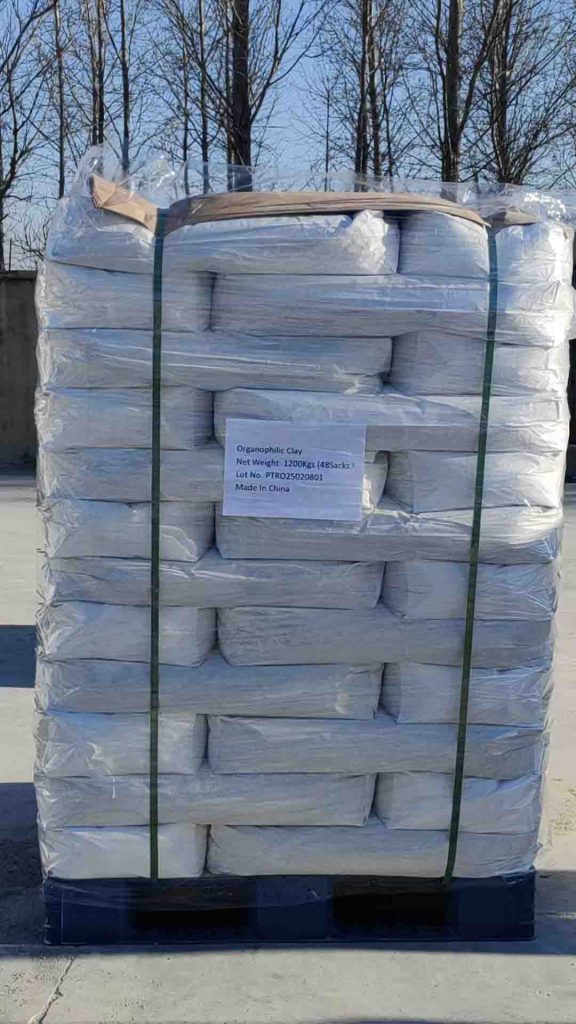Organoclay Solution | how to reduce ink sedimentation
Organoclay Solution for Inks : When we process the montmorillonite raw material of organophilic clay bentonite, the main goal is to make it form a three-dimensional network structure, so that the interlayer structure of montmorillonite can form nano-scale gaps.
This is what we call intercalation modification technology. In some low-polarity solvents, such as mineral oil, long-chain alkanes produce Brownian motion effects, so that pigment particles are physically isolated, especially some carbon black, titanium blue, etc. are effectively physically isolated.
This treatment can greatly reduce the sedimentation rate. This rate reaches 0.08mm per hour.


Organoclay Solution | How 0.53g/cm³ Density Prevents Pigment Agglomeration
Organoclay Solution: We conducted a set of comparative tests between our Organoclay Solution CP180 and traditional organic bentonite to test its anti-settling performance.
Comparing the difference in 24-hour sedimentation volume, the traditional organic bentonite is greater than or equal to 15%, while our CP180 has a sedimentation volume of less than or equal to 2%. The contrast of this ratio is very large.
This is why we especially recommend you to use our CP180 in your ink production. Then we tested the second set of data, the shear force required for dispersibility.
This comparative test shows that traditional high-density bentonite requires 1200 revolutions of shear force to achieve effective dispersibility. However, our CP180 can achieve the desired dispersion effect at only 800 revolutions. In some application scenarios, we use the anti-settling performance of our organic bentonite and apply it to high-solid content printing inks, such as some gravure packaging inks, to solve the color difference caused by pigment sedimentation.
It is particularly suitable for some systems with a viscosity range of 500~2000.
Therefore, if you want to get the pigment of the ink to be evenly dispersed and without sedimentation, we strongly recommend you organo bentonite CP180, which is an ideal choice for ink.
Organoclay Solution | 72-Hour Stability Guarantee: Lab-Proven Performance in Aromatic-Free Inks
Organoclay Solution : Our organic bentonite clay has strong chemical compatibility in some inks of different applications. In the synergistic effect with some low-grade resins, it can avoid phase separation caused by density mismatch. We generally recommend that their addition amount be between 2% and 5%. It can be effectively compatible with hydrocarbons, resins, rosin, etc.
Organoclay Solution | 30% Logistic Cost Saving: Bulk Density Optimization for Global Shipping
We have various ways to package organoclay bentonite. It is divided into 25kg per package and 50lb per package. A 20-foot container can hold 18 tons. A 40-foot container can hold 25 tons. Due to its density, the loading capacity of our organoclay bentonite can be greatly increased, which greatly reduces the cost of ocean shipping.
CP-24 is a new style of organoclay rheological additive made from bentonite. It is used in solvent and resin systems covering medium polarity to high polarity range. It is adapted for aromatic solvent, ester, ketone, alcohol and resins in medium and high polarity such as two-component polyurethane, fluorocarbon coating, epoxy coating, zinc-rich coating etc. 
Properties
Composition Organic derivative of a montmorillonite clay
Appearance Fine powder, light yellow
Moisture content (105℃,2hr) ≤3.5%
Loss on ignition (1000℃) (36.5±2.5)%
Bulk density 0.40-0.60g/cm3
Fineness (<74μm, %) ≥99
Dispersion fineness (μm) ≤10
Advantages
- High purity, low silica content. The Quartz content is less than0.5%.
- Fine dispersion and particle size.
- Good self-activated property.
- Gel is very transparent and of light color.
- Wide application range including low polarity to high polarity systems.
- Polar activator can be eliminated.
- High anti-settling and anti-sag performance.
Application
CP-24 is used in the following applications:
- Oil Drilling Mud
- Sealants and adhesive.
- Inks